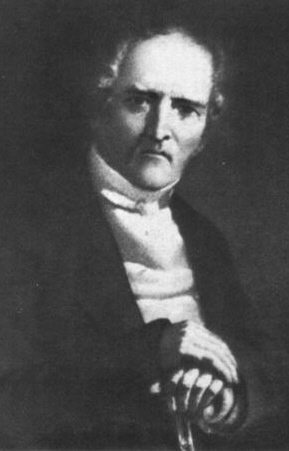
The contemporary rediscovery of Charles Fourier owes a great deal to André Breton, who saw in him a precursor of surrealism. His recognition of Fourier's importance is manifested in his long poem Ode à Charles Fourier, and also by the latter's inclusion in his Anthologie de l'humour noir.
Before World War II, Breton did not know much about Fourier...
En ce temps-là je ne te connaissais que de vue
Je ne sais même plus comment tu es habillé
But he could see his statue standing on a boulevard in Paris:
Mais on ne saurait trop complimenter les édiles
De t'avoir fait surgir à la proue des boulevards extérieurs
Incidentally, the statue was brought down and melted by the Nazis in 1944, in order to make a cannon...
Fourier es-tu toujours là
During most of the war, Breton was a refugee in the USA. In 1945 he visited the "Indian reserves" in the south-west and discovered thus the Native American culture and art. About the same time he read Fourier's works, and this led him to write his Ode à Charles Fourier.
In its form, the text alternates a traditional surrealist poem (without rhyme nor punctuation) and a prose text which looks like a development of Fourier's theories. In fact it is mainly a confrontation between Fourier's dream of a harmonious society, and the 20th century's nightmares of imperialism, fascism, and stalinism, which reached an unforeseen peak before and during the war.
D'aucuns se prennent à choyer dans les éboulis au bord des mares
Des espèces qui paraissent en voie de s'encroûter définitivement
Mais qui les circonstances aidant ne semblent pas incapables d'une nouvelle reptation
Et passent pour nourrir volontiers leur vermine
Contemporary reactionnaries are compared to the cycles of prehistoric fauna that Fourier imagined having arisen through successive animal creations achieved by the living Earth:
Par ma foi les grands hagards de la faune préhistorique
Ne sont pas si loin ils gouvernent la conception de l'univers
Et prêtent leur peau halitueuse aux ouvrages des hommes
If Fourier is to be taken as a cure for a world dominated by violence, greed, and totalitarism, it is at first hand necessary to relieve him from the traditional accusation of being an "utopian" pacifist:
On a beau dire que tu t'es fait de graves illusions
Sur les chances de résoudre le litige à l'amiable
A toi le roseau d'Orphée
Breton voices also his disillusion with the degeneration of the violent Russian Revolution (compared here with a ram), that he had worshiped 20 years before:
Tour à tour l'existence de cette bête fabuleuse m'exalte et me trouble
Quand elle a donné de la tête le monde a tremblé et il y eut d'immenses clairières
Qui par places ont été reprises de brousse
Maintenant elle saigne et elle paît
Some doubts arise concerning Marxist revolutionaries such as Lenin:
Le drame est qu'on ne peut répondre de ces êtres de très grandes proportions
qu'il advient au génie de mettre en marche et qui livrés à leurs propres ressources
n'ont que trop tendance à s'orienter vers le néfaste à plus forte raison si le recours
à un néfaste partiel et envisagé comme transitoire à l'effet même de réduire dans
la suite le néfaste entre dans les intentions dont ils sont pétris
So if Fourier's ideas are to be adopted again, some of his blatant errors must be corrected, in particular his antisemitism:
Fourier on s'est moqué mais il faudra bien qu'on tâte un jour bon gré mal gré de ton remède
Quitte à faire subir à l'ordonnance de ta main telles corrections d'angle
A commencer par la réparation d'honneur
Due au peuple juif
There is an assesment of the actual status of the 12 passions according to Fourier. The picture is grim, as in the following brief statement concerning the alternating mechanizing passion:
Cri du sphinx Atropos. Travail à la chaîne.
Fourier is recognized as a surrealist because he did not only wanted to revolutionnize society, but to completely change life:
Mais ce qui me débuche à jamais la pensée socialiste
C'est que tu aies éprouvé le besoin de différencier au moins en quadruple forme la virgule
Et de faire passer la clé de sol de seconde en première ligne dans la notation musicale
Parce que c'est le monde entier qui doit être non seulement retourné mais de toutes parts
aiguillonné dans ses conventions
Breton salutes also Fourier's recognition of the importance of sleep and dream:
Parce que tu as compris que l'état surcomposé ou supra-mondain de l'âme (qu'il ne s'agit plus
de reporter à l'autre monde mais de promouvoir dans celui-ci) devait entretenir des relations
plus étroites avec l'état simple ou infra-mondain, le sommeil, qu'avec l'état composé ou
mondain, la veille, qui leur est intermédiaire
The revelation of Fourier is linked with that of Native American culture, both being felt as a liberation of imagination and art...
Je te salue de l'instant où viennent de prendre fin les danses indiennes
Au coeur de l'orage
Et les participants se groupent en amande autour des brasiers à la prenante odeur
de pin-pignon contre la pluie bien aimée
Une amande qui est une opale
Exaltant au possible ses feux rouges dans la nuit

The incorporation of Charles Fourier in surrealist thought was also due to his use of analogy as a mode of acquiring knowledge. Furthermore after World War II, Breton's rejection of Marxism, which he identified with Stalinism, led him to search for new sources of socialist principles, which he found partly with 19th century "utopians" and partly with Anarchism.
The interest for Fourier grew in France as the events of May 68 were approaching. Shortly after Breton's death in 1966, the personal notes of Charles Fourier, which one thought had been destroyed during the war, were found. This led to the publication of Le Nouveau Monde Amoureux, edited by Simone Debout. Other classical books by him were published again, including his complete works.
In 1969, Fourier's statue in Paris, which had been destroyed by the Nazis, was replaced by the "Gay-Lussac street barricaders" and art school students with a new bronze-covered plaster statue. The police, sensing a perturbation of public order, removed the statue, which caused its breaking.
The Ode à Charles Fourier has been published by Gallimard (in a book called Signe ascendant), and recently by Fata Morgana.